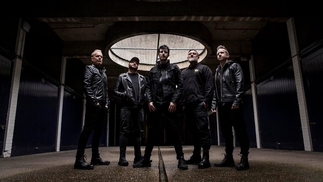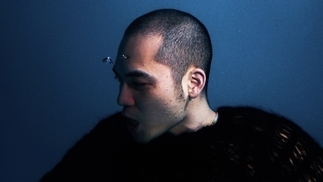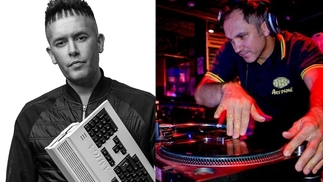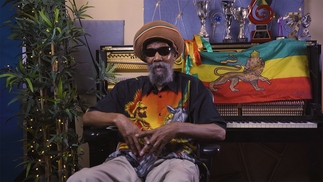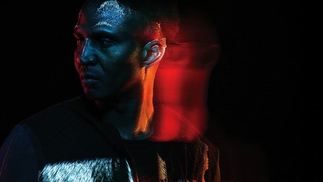On Cue: Sully

Sully celebrates the infinite potential of the breakbeat in his thrilling On Cue mix, and chats to Oskar Jeff about his new release on 2 Bad Mice’s Over/Shadow label, how he got into jungle, and the influence of dubstep, post-rock and The Cure on his meticulous sound
In the UK jungle scene, Sully’s name is synonymous with quality. Since surfacing in the late 2000s post-dubstep scene, he’s not put a foot wrong, shifting from his early leftfield garage excursions to blistering jungle. On releases like 2019’s single ‘Porcelain/Run’ on Uncertain Hour and last year’s excellent ‘Swandive’ on Astrophonica, Sully balances meticulous craft and bruck-out ferocity with glee.
His latest single, ‘5IVES/Sliding’, is out now on Over/Shadow, the spiritual successor to the 1990s powerhouse Moving Shadow, reinvigorated in 2020 by rave figureheads 2 Bad Mice. Alongside Metalheadz, Moving Shadow was arguably the most iconic imprint for these strains of UK breakbeat science. After launching with a 12-inch from Blame, they’ve released singles and EPs from Dom & Roland, ASC, DJ Trax and, now, Sully.
“To be honest, the older generation often weren’t really aware of the newer wave of artists,” says Sully, of past divides. “Musically, they’re usually in two completely different places. But I became aware of Over/Shadow through talking to [Brighton-based producer] Etch; that’s when I realised that these guys are actually aware of what’s going on. They’ve found a new generation of people and are making contact with them, which is exciting to see.”
As jungle resurfaces as a dominant influence on a wide range of contemporary club producers and DJs, this kind of cross-generational collaboration is vital for both historical context and evolution of the sound — and the genuine enthusiasm between the two generations bodes well for the future. “Si has always been so enthusiastic about my stuff,” says Sully. “Every release I’ve put out has felt like it has had an impact on him. You can’t ask for more than that from a label. When someone’s got that emotional connection to stuff that you’ve done, that’s when it makes sense for me.”
‘5IVES/Sliding’ continues Sully’s descent into junglist bedlam. His sound has long been noted for its visceral nature, but across his past few releases, he’s developed a knowing sense of scale; an embracing of dancefloor maximalism that gives the subsonic heft a cinematic quality. “It’s something I’ve always been drawn to,” he says, of this new mood. “I’m into stuff like Godspeed You! Black Emperor, Kate Bush and The Cure. It didn’t occur to me before, but these influences must be coming through.”
The new tracks were produced over lockdown so, understandably, they’ve only clicked for Sully since the recent reopening of UK clubs. “It’s been causing some mayhem already! ‘5IVES’ is one of those tunes where I pushed myself a bit; and that’s always uncomfortable, you just don’t know if it’s going to translate. When I made it, I had no idea if it was any good, I had to wrestle with it. I sent it to a few people and it became clear that it worked — especially now, having spent some time with it, and having played it in its intended environment.”

There are two guiding principles to Sully’s music: a considered distillation of the necessary elements of soundsystem music, and an attention to detail that allows personality to come through. These principles come from his formative years, growing up around the free party soundsystems of the English home counties, and his somewhat obscure choice of production software.
“I produce using Renoise, which is a tracker. It’s a lot like Ableton, but with a vertical grid rather than a horizontal thing,” Sully says. “It definitely has an impact on the way I sequence stuff, because you can get in and do really detailed work. It’s quite an idiosyncratic way of working, but it suits me, and it’s something that has history within jungle music. A lot of the original jungle producers started on Amiga computers. This would have been the kind of software they’d have used, but obviously it’s come a long way since then.”
As the accessibility and sophistication of software continues to develop, it seems the possibilities of the humble breakbeat remain limitless. Sully’s enthusiasm for the prospects are as infectious in conversation as they come across on record. “There was a point in computer technology where it felt like, ‘We’ve done everything now’: where it was all about just making the best emulation of a 909, copying technology that already existed,” he continues. “But I think we’ve got to the point now where there’s more to explore with just ripping sounds apart, and I think that’s starting to become more widely used. The technology’s been there for like 10 to 15 years, but it was more in the area of academic study — it wasn’t the sort of thing you could just load up as a VST. I always thought that there’s got to be more you can do with it, but not many people are pushing it. That’s what I’ve been trying to do.”
Though focused on this solo, often inward work, Sully is quick to namecheck his contemporaries, many of whom are approaching this updated deconstruction of breakbeats from their own directions. “Something like aya’s ‘That Hyde Trakk’ blew my mind! I was so late to the party, but I just had to share it for anyone, like me, that hadn’t heard it,” he beams. “It opened my mind to the idea that there’s a lot more that can be done with breakbeats, while still having some sort of connection to jungle and hardcore. You can push it a lot further!
“I like Forest Drive West as well: it’s a different approach, but there’s a complexity and a finesse to what he’s doing with his drum edits,” he continues. “You can clearly see the lines between what he’s doing and someone like Equinox, but there’s just another element there; a depth to it that I think people haven’t touched on in the past.” Fundamentally though, for all the advancements in technology, the recurring endpoint is that this music’s built for soundsystems, be they in clubs, fields or warehouses. Sully’s experimentations, though process-heavy, are always in aid of this. “The more time I’ve spent writing music for soundsystems, the more I’m aware that percussive sounds translate best. It’s rhythmic music for dancing, it cuts through everything. If you’re just working with drums, that can be quite limiting, but a lot of people have done a lot with drums,” he emphasises.
“Even in early jungle music, the boundaries between rhythm and melody were blurred, with people pitching up snare samples to make melodies... I think that experimentation kind of hit a brick wall after a while, and people started focusing more on basslines or sound design, but it seems to me that there are more opportunities to play around with that now. It’s about finding techniques that work, and they are often happy accidents.”

As a young teenager who fell in love with raving, Sully got stuck into a broad spectrum of heavy electronic music, like Autechre, Aphex Twin and the UK acid techno sound. “I spent quite a few years following Chris Liberator and D.A.V.E. The Drummer, all that sort of world of mad free parties,” he beams. Then dubstep happened. “Garage suddenly made sense after hearing dubstep,” he says. “My perception of garage [before that] was So Solid Crew being played through crappy phone speakers. It was just hi-hats and MCs. I didn’t understand it. With dubstep, you couldn’t not hear the bassline because that’s all there was.”
The initial charm of dubstep seemed to be a symbolic fusing of that intense free party energy and IDM’s boundless experimentation — not necessarily stylistically, but in its bridging of ideals. “I loved ridiculous gabber drums, but I also loved Boards Of Canada. In a way, dubstep almost felt like a midway between the two: sort of avant-garde, but really heavy at the same time.”
Through listening to dubstep, Sully made an early connection with Keysound Recordings, the London-based label run by music journalist and DJ Martin “Blackdown” Clark. “I used to listen to their Rinse show and ended up sending some tunes over. Blackdown was always hardworking in terms of listening to everything he got sent. I think at the height of it, he was getting sent about 6GBs of music a month, and he listened to all of it!” he says with delighted surprise. “He was pretty keen on my stuff, so it went from there. It was its own thing for a few years, there’s a lot of great records to go back to. It was definitely an exciting point, it was kind of the tail-end of dubstep, and then everyone sort of went off in slightly different directions.”
Sully released a 12-inch and an eight-track EP on Keysound Recordings, in 2010 and 2014 respectively, and two albums, 2011’s ‘Carrier’ and 2017’s ‘Escape’. Across the later releases, Sully moved in a different direction from the dubstep bass weight, incorporating higher tempos into his projects. It was at this point that jungle grabbed his attention.
“Joe Shakespeare, who now co-runs the label Knives, was my housemate at university, and he was big into ragga jungle and breakcore back then. We used to have parties with a crew in Norwich called Amen-tal. We’d run the downstairs room, playing dubstep, and they’d have the big room upstairs, booking the likes of Remarc. Those parties are where I really connected with jungle,” he insists. “It was also just one of those things you heard growing up. Hearing ‘Super Sharp Shooter’ nowadays has the same effect on me as hearing a SNES soundtrack. It’s a tenuous route into an interest in jungle music, admittedly, but since I’ve gotten into hyper-edited breaks, I haven’t been able to slow down!”
Though jungle remains the focus, Sully still dabbles in slower tempos. A 2019 collaboration with garage legend El-B supplied a change in process. “He was between studios, so we ended up starting two to three tracks on an iMac with no monitors, just out of the built- in speakers,” he laughs, “so every sound had to cut through. It was interesting.”
The project saw release under the moniker El-Sull on GD4YA, a label that may have also sparked the fuse for his next steps as a producer. “I also did a remix for SW2 on the label. He had a track with the jazz drummer Moses Boyd, and that was great. Just having the drum track, it was so much fun to play with. I think, over the next year, I’m going to be exploring working with live musicians for a project, and we’ll see what that ends up becoming.” Whatever the next move, Sully is nowhere near done with his forensic dissection of breakbeats. With dancefloors reopening, that can only be a good thing.
